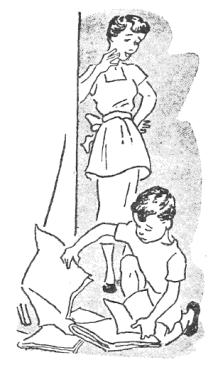 Filial Piety
Filial Piety
The two words, filial piety, are important to all civilized peoples, but they are doubly important to Buddhists. The actual words mean duties of children to parents, but there is a much deeper meaning in these words if we are faithful followers of Lord Buddha. The young are not only under a holy obligation to show respect and affection for their parents, but also to be considerate of all elderly persons and to be helpful towards them in such ways as to bring happiness into their lives. In some countries of the world the idea of filial piety has been almost forgotten. We can see quite clearly that those countries are slipping backwards towards unhappiness.
We Buddhists consider the family as being the most important of all groups. Of course, we think that Buddhist associations, Dharma schools, youth groups and many other clubs, societies and groups are all very important and worthwhile, but the family is most important of all. It is in the family that we first learn the meaning of affection and also get our first knowledge of the difference between right and wrong. Moreover, it is in the family that we learn the ever so necessary art of living in harmony with others. There we learn the lesson that unselfishness and consideration for others make life easier for all of us.
There are two sides to filial piety, just as there are two sides to a coin. One side is the duty of the young to their elders and the other is the duty of the elders to the young. Parents and elders are under an obligation to set good examples to children and to be unfailingly kind and helpful in every good way. If this good example is set, then it is easy and natural for the young to have respect and affe tion for their parents and elders. We must never make the mistake of thinking of filial piety as being one-sided thing. Such a condition could be as strange as a coin with but one side. Parental piety must always go along with filial piety.
In the daily newspapers we read much about “delingquent children”, but when we talk to most of these boys and girls who have been sent to special schools for “naughty children”, we usually find they are just normal, average boys and girls and the real reason why they became “delinquent” was because they were neglected by their elders and never taught the difference between right and wrong. Surely such parents are not Buddhists/ It is rather unreasonable to expect filial piety and good conduct from the very young, if their elders fail to set the proper example and to give the affectionate guidance every child needs as preparation for a good, wholesome, happy life. Many judges say that there are far more delinquent parents than children who are really naughty. A Dharma school is a wonderful idea, but the real instruction in right living must begin in the home. The lessons in this book are designed for children, but this one subject is suitable for parents, too. In fact, it ought to be very carefully read and thought about by every Buddhist parent.
The Twig and The Tree
Gently teach the little children
How to walk the Buddha-way;
Show with kindness affection,
What to do and what to say.
Even as a tiny twig, if twisted,
Grows into a twisted tree,
So do men and women follow
Patterns learned from infancy.
Let us then make sure that always
Example right we clearly show,
So that our youth in life may never
Down the path of evil go.
Teach the young the path to follow;
Show them in their days of youth,
And when old they’ll never waver
From Lord Buddha’s Path of Truth.
-Sumangalo.
Questions
1. What is meant by filial piety?
2. What are the two sides to filial piety?
3. Must young people show respect and kindness only to the old in their own families?
4. If boys and girls are not taught right thought and right action, are they likely to grow up with good ideas of filial piety?
5. Is it easy to respect a person who sets a bad example?
6. Where is the proper place to begin the moral instruction of children?
7. Name some ways we can show respect for our elders.
8. Do you think it would be a good idea for Dharma school to give an entertainment once or twice a year and invite the parents and elders?
9. What do we mean when we say “a twisted twig grows into a twisted tree”?
10. Do you think it would be a good idea for all parents to read and understand this lesson?
Collect from Buddhist Sunday School Lessons by The Venerable Sumangalo
655 lượt xem
Tin khác

THÔNG ĐIỆP VESAK 2022 của Tổng Thư Ký Liên Hiệp Quốc Tôi xin gửi lời chúc mừng nồng nhiệt nhất đến tất cả những ai đang hướng về kỷ niệm…

Pháp thoại CẢM NIỆM VÀ Ý NGHĨA CÚNG DƯỜNG PHẬT ĐẢN PHẬT LỊCH 2562 Tỷ Khưu THÍCH THÁI HÒA NAM MÔ BỔN SƯ THÍCH CA MÂU NI PHẬT Phật…



